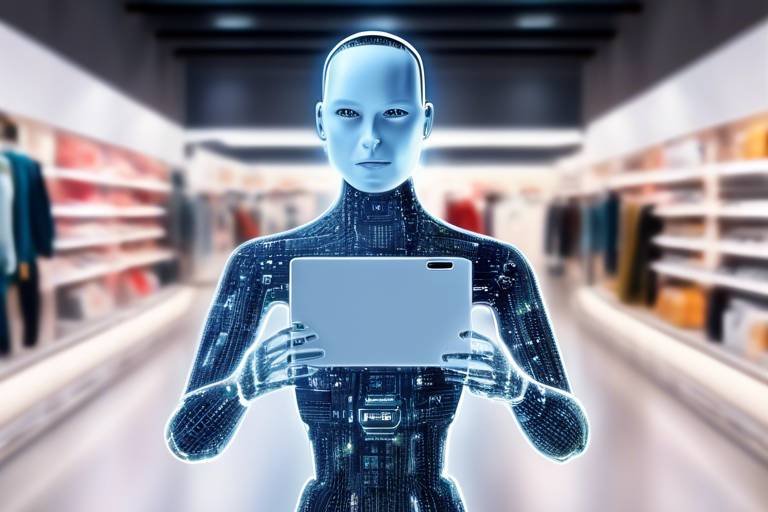The Role of AI in Smart Retail Solutions
Artificial Intelligence (AI) is not just a buzzword—it's a game changer in the retail industry! Imagine walking into a store where every product recommendation feels like it was made just for you. That's the magic of AI in smart retail solutions. This technology is reshaping how retailers interact with customers, streamline their operations, and ultimately drive sales. From personalized shopping experiences to efficient inventory management, AI is at the heart of a retail revolution that promises to enhance every facet of the shopping journey.
As we dive deeper into this topic, we’ll explore how AI is enhancing customer experiences, optimizing operations, and driving sales through innovative smart retail solutions. We'll look at the various components that make up smart retail, the powerful insights AI provides, and how automation is changing the face of retail operations. Buckle up, because the future of shopping is not just bright; it's intelligent!
So, what exactly is smart retail? In simple terms, it refers to the integration of advanced technologies within retail environments to create a more engaging and efficient shopping experience. Think of it as the bridge between traditional retail and the digital world. Smart retail encompasses a variety of tools and technologies, including AI, the Internet of Things (IoT), and data analytics. These elements work together to enhance customer engagement, streamline operations, and ultimately improve the overall shopping experience.
The benefits of smart retail are numerous. For starters, it allows retailers to understand their customers better, tailoring experiences to meet individual preferences. Additionally, smart retail solutions can significantly reduce operational costs by optimizing inventory and supply chain processes. In a world where consumer expectations are constantly evolving, embracing smart retail is not just an option; it's a necessity for survival.
One of the most exciting aspects of AI in retail is its ability to gather and analyze customer data. This capability provides retailers with invaluable insights into shopping behaviors and preferences. Imagine being able to predict what your customers want before they even know it themselves! AI-powered analytics can drive personalized marketing strategies that resonate with consumers on a deeper level, ultimately improving customer loyalty.
To harness the power of AI, retailers employ various methods to collect customer data. These techniques include:
- In-store sensors: These devices track customer movements and interactions within the store.
- Online tracking: Retailers analyze browsing patterns and purchase history from their websites.
- Social media analytics: Insights from social media interactions can reveal customer sentiments and trends.
Each of these methods plays a crucial role in understanding consumer behavior and crafting strategies that resonate with shoppers.
However, as data collection increases, so do concerns about customer privacy. The ethical implications of data usage in smart retail cannot be overlooked. Retailers must navigate a complex landscape of regulations and consumer expectations to ensure that they are collecting and using data responsibly. Transparency is key; customers should feel confident that their information is being handled securely and ethically.
AI can significantly enhance customer experiences through personalization and tailored recommendations. For instance, many retailers now use AI algorithms to analyze past purchases and suggest products that align with individual preferences. This not only increases the likelihood of a sale but also fosters a sense of loyalty among customers who feel understood and valued.
Another exciting application of AI in retail is predictive analytics. By utilizing historical data, retailers can forecast future trends and make informed decisions. This capability is particularly beneficial for inventory management and sales forecasting. Imagine a retailer being able to predict which products will be in high demand next season—this not only improves customer satisfaction but also minimizes the risk of overstock or stockouts.
AI-driven automation is transforming retail operations by streamlining processes such as inventory management, supply chain logistics, and customer service. The advantages of automation are clear:
- Increased efficiency: Automation reduces manual tasks, allowing employees to focus on more strategic initiatives.
- Cost reduction: Optimized operations lead to lower overhead costs.
- Improved accuracy: AI minimizes human error in tasks such as inventory tracking and order processing.
Chatbots and virtual assistants powered by AI are revolutionizing customer service in retail. These tools provide immediate assistance, answering queries and guiding customers through their shopping journeys. Imagine having a personal shopping assistant available 24/7, ready to help you find the perfect product or answer your questions. This level of accessibility not only improves customer satisfaction but also enhances brand loyalty.
AI technologies are also optimizing inventory management through real-time tracking and demand forecasting. Retailers can now gain insights into stock levels, sales trends, and customer preferences, allowing them to make data-driven decisions that reduce costs and minimize stockouts. The result? A smoother shopping experience for customers and a more efficient operation for retailers.
The future of AI in retail promises even more innovations and advancements. As technology continues to evolve, we can expect to see emerging trends such as enhanced virtual reality shopping experiences, more sophisticated predictive analytics, and even greater integration of AI into supply chain management. The retail landscape is changing rapidly, and those who embrace these changes will be at the forefront of the industry.
Q: How does AI improve customer experience in retail?
A: AI enhances customer experience by providing personalized recommendations, improving customer service through chatbots, and analyzing shopping behaviors to tailor marketing strategies.
Q: What are the privacy concerns associated with AI in retail?
A: Privacy concerns include the ethical implications of data collection and usage, as well as the need for transparency in how customer data is handled.
Q: What role does predictive analytics play in retail?
A: Predictive analytics helps retailers forecast future trends, improving inventory management and sales forecasting, ultimately leading to better decision-making.

Understanding Smart Retail
Smart retail is not just a buzzword—it's a game-changer in the retail landscape. Imagine walking into a store where everything is tailored just for you, from the products on the shelves to the personalized discounts you receive. This is the essence of smart retail: the integration of advanced technologies that transform traditional shopping experiences into something truly remarkable. At its core, smart retail combines artificial intelligence, machine learning, and data analytics to create a seamless interaction between retailers and customers.
The key components of smart retail include customer engagement, operational efficiency, and data-driven decision making. These elements work together to enhance the overall shopping experience, making it more enjoyable and efficient for consumers. For instance, retailers can leverage data analytics to understand what products are trending, allowing them to adjust their inventory accordingly. This not only improves customer satisfaction but also boosts sales and reduces waste.
One of the most significant benefits of smart retail is its ability to create a personalized shopping experience. Thanks to AI algorithms, retailers can analyze customer behavior and preferences, allowing them to offer tailored recommendations. Picture this: you walk into a clothing store, and the moment you enter, the system recognizes you and suggests outfits based on your previous purchases. This level of personalization is made possible through the smart retail framework, which utilizes in-store sensors, mobile apps, and online data to gather insights.
Moreover, smart retail isn't just about enhancing customer experience; it also streamlines operations. By automating various processes, retailers can significantly reduce operational costs and improve efficiency. For example, AI can predict stock levels based on historical sales data, ensuring that popular items are always available while minimizing excess inventory. This leads to a more sustainable business model, where resources are used wisely, and waste is minimized.
In summary, smart retail is revolutionizing the way we shop by merging technology with consumer needs. It creates an ecosystem where retailers can thrive, and customers can enjoy a more tailored and efficient shopping experience. As we delve deeper into the world of smart retail, it's essential to understand how these technologies not only benefit businesses but also enhance customer loyalty and satisfaction.

AI-Powered Customer Insights
In the rapidly evolving world of retail, understanding your customers is more crucial than ever. Enter artificial intelligence, a game-changer that empowers retailers to dive deep into the ocean of customer data. With AI, businesses can not only gather vast amounts of information but also analyze it to uncover valuable insights that drive decision-making. Imagine having a crystal ball that reveals your customers' shopping habits, preferences, and even their future buying behaviors. Sounds incredible, right? Well, that’s the magic of AI-powered customer insights!
These insights are not just numbers on a spreadsheet; they represent real people with unique preferences and shopping journeys. Retailers can leverage this data to tailor their marketing strategies, ensuring that the right message reaches the right audience at the right time. For instance, if a customer frequently buys organic products, AI can help retailers send personalized promotions or product recommendations that align with their interests. This level of personalization fosters a stronger connection between the brand and the customer, ultimately enhancing customer loyalty.
To achieve this, retailers employ various data collection techniques that harness the power of AI. These methods include:
- In-store sensors: These devices track customer movements and interactions within the store, providing insights into shopping patterns.
- Online tracking: By monitoring online browsing behaviors and purchase history, retailers can create detailed customer profiles.
- Social media analytics: Analyzing customer interactions on social media platforms helps retailers understand brand perception and customer sentiments.
However, as we dive deeper into data collection, we must also address the elephant in the room: privacy considerations. With great power comes great responsibility, and retailers must navigate the ethical implications of data usage. Customers are becoming increasingly aware of how their data is being utilized, and regulations like GDPR have set the stage for stricter compliance. Retailers need to be transparent about their data practices, ensuring that customers feel secure and valued.
Moreover, AI can significantly enhance the customer experience through personalized interactions. Imagine walking into a store where the staff already knows your preferences, or receiving tailored recommendations based on your past purchases. Retailers like Amazon and Netflix have already set the bar high with their AI-driven customer engagement strategies. These companies utilize sophisticated algorithms to analyze user behavior, allowing them to suggest products or content that align perfectly with individual tastes. It’s like having a personal shopper who knows you inside out!
In summary, AI-powered customer insights are revolutionizing the retail landscape. By harnessing the power of data, retailers can create personalized experiences that resonate with customers, ultimately driving sales and fostering loyalty. As we continue to embrace AI in retail, the possibilities for enhancing customer engagement are limitless. So, are you ready to unlock the potential of AI in understanding your customers better?
Q1: How does AI improve customer insights?
AI analyzes vast amounts of customer data to identify patterns and trends, providing retailers with actionable insights that can enhance marketing strategies and customer engagement.
Q2: What are the main data collection techniques used in retail?
Retailers commonly use in-store sensors, online tracking, and social media analytics to gather data about customer behaviors and preferences.
Q3: What are the privacy concerns related to AI in retail?
As retailers collect more customer data, concerns about privacy increase. It is essential for businesses to be transparent about their data usage and comply with regulations to protect customer information.
Q4: Can AI really personalize customer experiences?
Absolutely! AI enables retailers to analyze customer data and deliver personalized recommendations, promotions, and experiences, making customers feel valued and understood.

Data Collection Techniques
In the fast-paced world of retail, understanding customer behavior is vital for staying ahead of the competition. To achieve this, retailers are employing a variety of that harness the power of technology. By utilizing these methods, businesses can gain valuable insights into their customers' shopping habits, preferences, and overall experiences. So, what are these techniques, and how do they work?
One of the most prevalent methods is the use of in-store sensors. These sensors can track customer movements, interactions with products, and even the time spent in different areas of the store. Imagine walking into a store and having it know exactly where you spend your time! This technology not only helps retailers understand which products attract customers but also informs them about traffic patterns within the store.
Another effective technique is online tracking. Through cookies and tracking pixels, retailers can gather data on customers' online behaviors, such as pages visited, time spent on each page, and items added to shopping carts. This information is crucial for creating personalized shopping experiences and targeted marketing campaigns. For instance, if a customer frequently browses a specific category of products, retailers can send tailored promotions to encourage purchases.
Additionally, social media analytics plays a significant role in data collection. By monitoring social media interactions, retailers can gauge customer sentiment, identify trending products, and even respond to customer feedback in real-time. This not only enhances customer engagement but also builds brand loyalty. Retailers can analyze what customers are saying about their products or services, allowing them to adapt their strategies accordingly.
However, while these techniques offer immense benefits, they also come with challenges, particularly regarding customer privacy. As retailers collect more data, they must ensure they comply with regulations and ethical standards to protect consumer information. Balancing the need for data with respect for privacy is crucial in maintaining customer trust.
In conclusion, the various data collection techniques employed by retailers are transforming how they understand and engage with their customers. From in-store sensors to online tracking and social media analytics, these methods provide valuable insights that can drive personalized marketing strategies and enhance overall shopping experiences. As technology continues to evolve, retailers must remain vigilant in their approach to data collection, ensuring that they respect customer privacy while reaping the benefits of these innovative techniques.
- What are data collection techniques in retail? Data collection techniques in retail refer to methods used to gather information about customer behaviors and preferences, such as in-store sensors, online tracking, and social media analytics.
- How do in-store sensors work? In-store sensors track customer movements and interactions within a store, helping retailers understand traffic patterns and product engagement.
- What is the role of online tracking? Online tracking uses cookies and tracking pixels to monitor customers' online behaviors, enabling personalized shopping experiences and targeted marketing.
- Why is customer privacy a concern? As retailers collect more data, they must ensure compliance with regulations and ethical standards to protect consumer information and maintain trust.

Privacy Considerations
As the retail landscape rapidly evolves with the integration of artificial intelligence, one pressing issue that emerges is the privacy of customer data. With AI's ability to collect and analyze vast amounts of information, retailers must tread carefully to balance the benefits of data-driven strategies with the ethical implications of data usage. The reality is that consumers are becoming increasingly aware of their privacy rights, and their trust is paramount for businesses aiming to thrive in this new age of smart retail.
In the quest for personalized shopping experiences, retailers often employ various data collection techniques such as in-store sensors, online tracking, and social media analytics. While these methods can provide valuable insights into consumer behavior, they also raise significant privacy concerns. For instance, customers may feel uncomfortable knowing that their every move is being monitored, whether they're browsing a store or scrolling through social media. This leads to a critical question: How much data collection is too much?
To address these concerns, retailers need to implement robust data protection policies that not only comply with regulations but also foster trust with their customers. This includes being transparent about what data is collected, how it is used, and who it is shared with. For example, retailers could provide clear privacy notices at the point of data collection, ensuring customers are fully informed before they consent to share their information.
Moreover, the introduction of regulations like the General Data Protection Regulation (GDPR) and the California Consumer Privacy Act (CCPA) has set stringent guidelines for data handling practices. Retailers must ensure that they are not only compliant but also proactive in safeguarding customer data. This can be achieved through measures such as:
- Data Minimization: Collect only the data that is necessary for specific purposes.
- Data Anonymization: Remove personally identifiable information to protect customer identities.
- Regular Audits: Conduct frequent reviews of data practices to ensure compliance and identify potential risks.
Ultimately, the success of AI in retail hinges on the ability to build and maintain customer trust. By prioritizing privacy considerations and adopting ethical data practices, retailers can enhance their reputation and foster long-term loyalty among consumers. In this digital age, where information is power, respecting customer privacy is not just a legal obligation; it’s a fundamental aspect of responsible business practice.
- What measures can retailers take to protect customer data? Retailers can implement data encryption, conduct regular security audits, and ensure compliance with privacy regulations.
- How can consumers protect their privacy while shopping? Consumers can review privacy policies, use incognito modes while browsing, and limit the information they share with retailers.
- What are the consequences of failing to protect customer data? Retailers may face legal penalties, financial losses, and damage to their reputation if they fail to protect customer data adequately.

Enhancing Customer Experience
In today's fast-paced retail environment, is not just a goal; it's a necessity for survival. With the rise of e-commerce and the ever-evolving consumer expectations, retailers must leverage advanced technologies, particularly artificial intelligence, to create memorable shopping experiences. Imagine walking into a store where the moment you enter, the system recognizes you and greets you by name, suggesting products based on your previous purchases. This is not a scene from a sci-fi movie; it’s the reality that AI brings to smart retail.
AI-driven personalization is at the heart of this transformation. By analyzing vast amounts of data, retailers can tailor their offerings to meet individual customer needs. For instance, if a customer frequently buys organic products, the system can highlight similar items or suggest new arrivals in that category. This level of personalization not only enhances the shopping experience but also fosters customer loyalty, as shoppers feel understood and valued.
Moreover, AI technologies enable retailers to implement dynamic pricing strategies. This means prices can be adjusted in real-time based on demand, competition, and customer behavior. For example, if a customer has shown interest in a specific product but hasn’t purchased it yet, the retailer can send a timely notification offering a discount. This not only incentivizes the purchase but also enhances the overall shopping experience by making customers feel they are getting a deal tailored just for them.
Another fascinating aspect of AI-enhanced retail is the use of virtual fitting rooms and augmented reality (AR). Imagine a customer who is unsure about how a dress will look on them. With AR, they can try on the dress virtually, seeing how it fits and matches with other items in their wardrobe. This not only reduces the hassle of returns but also creates a fun and engaging shopping experience.
Furthermore, AI chatbots are revolutionizing customer service. These intelligent assistants can provide immediate responses to customer inquiries, assist with product searches, and even handle transactions. This 24/7 availability ensures that customers receive assistance whenever they need it, enhancing their overall experience. For instance, if a customer has a question about a product's features or availability, they can get instant answers without waiting for a human representative.
In conclusion, the integration of AI in retail is a game changer for enhancing customer experience. From personalized recommendations and dynamic pricing to virtual fitting rooms and responsive chatbots, the possibilities are endless. Retailers who embrace these technologies will not only meet but exceed customer expectations, creating a loyal customer base and driving sales in the process.
- How does AI improve customer experience in retail?
AI enhances customer experience by providing personalized recommendations, dynamic pricing, and immediate customer service through chatbots. - What are virtual fitting rooms?
Virtual fitting rooms use augmented reality to allow customers to try on clothes digitally, enhancing their shopping experience. - Can AI help with inventory management?
Yes, AI can optimize inventory management by predicting demand and tracking stock levels in real-time, reducing costs and minimizing stockouts.

Predictive Analytics in Retail
Predictive analytics is like having a crystal ball for retailers, allowing them to gaze into the future of consumer behavior and market trends. By leveraging historical data, AI algorithms can forecast what products will be in demand, helping retailers make informed decisions that can significantly impact their bottom line. Imagine being able to predict what your customers want before they even know they want it—that’s the power of predictive analytics!
At its core, predictive analytics involves the use of statistical algorithms and machine learning techniques to identify the likelihood of future outcomes based on historical data. For example, if a retailer notices a spike in sales of winter jackets every November, predictive analytics can help them anticipate similar trends in the future. This foresight enables businesses to adjust their inventory levels, marketing strategies, and even staffing needs accordingly. The ability to predict trends not only enhances operational efficiency but also improves customer satisfaction by ensuring that popular items are always in stock.
Moreover, predictive analytics is not just about sales forecasting. It can also play a crucial role in inventory management. By analyzing patterns in customer purchases, retailers can optimize their stock levels, reducing the risk of overstocking or stockouts. This means less waste and more satisfied customers who can find what they’re looking for when they visit the store or shop online. For instance, retailers can utilize predictive analytics to determine the right amount of seasonal merchandise to order, ensuring they meet customer demand without tying up too much capital in unsold inventory.
To illustrate the impact of predictive analytics, consider the following table that summarizes key benefits:
| Benefit | Description |
|---|---|
| Improved Inventory Management | Helps maintain optimal stock levels to meet customer demand without overstocking. |
| Enhanced Customer Experience | Ensures popular products are available, leading to higher customer satisfaction. |
| Informed Marketing Strategies | Allows retailers to tailor marketing efforts based on predicted consumer behavior. |
| Cost Efficiency | Reduces waste and lowers costs associated with unsold inventory. |
In addition to these operational benefits, predictive analytics can significantly enhance marketing strategies. By understanding customer preferences and behaviors, retailers can create targeted campaigns that resonate with their audience. For instance, if data indicates that a particular demographic is more likely to purchase a specific type of product, retailers can tailor their promotions to appeal directly to that group. This level of personalization not only boosts sales but also fosters stronger customer loyalty.
As we move forward, the role of predictive analytics in retail is expected to grow even more prominent. With advancements in technology and data collection methods, retailers will have access to even more granular insights into consumer behavior. This will enable them to refine their strategies continuously, staying ahead of the competition and meeting the ever-evolving needs of their customers.
- What is predictive analytics? Predictive analytics uses historical data and machine learning to forecast future trends and consumer behavior.
- How can predictive analytics benefit retailers? It can improve inventory management, enhance customer experience, inform marketing strategies, and increase cost efficiency.
- Is predictive analytics only for large retailers? No, businesses of all sizes can utilize predictive analytics to make informed decisions and improve operations.
- What tools are commonly used for predictive analytics in retail? Tools like Tableau, SAS, and Microsoft Power BI are popular for analyzing data and generating insights.

Automating Retail Operations
In today's fast-paced retail environment, automation is not just a luxury; it's a necessity. With the ever-increasing demands from consumers for faster service and better experiences, retailers are turning to artificial intelligence to streamline their operations. Imagine walking into a store where everything is perfectly organized, inventory is always stocked, and customer service is prompt and efficient. This is the future that AI-driven automation is creating for the retail industry.
One of the most significant advantages of automation is its ability to enhance efficiency. By automating repetitive tasks such as inventory management and supply chain logistics, retailers can focus on what truly matters: the customer. For example, AI systems can predict stock levels based on historical sales data, ensuring that popular items are always available. This not only minimizes stockouts but also reduces the costs associated with overstocking.
Moreover, automation improves accuracy in various operations. When humans are involved, there's always a chance of error, whether it's miscounting inventory or mishandling customer inquiries. However, with AI and automated systems, the risk of mistakes diminishes significantly. Retailers can implement automated inventory checks that provide real-time updates, allowing for quick responses to any discrepancies. This ensures that the store's inventory reflects what is actually available, leading to a smoother shopping experience for customers.
Another critical aspect of automation is its impact on customer service. Imagine a scenario where a customer walks into a store and has questions about a product. Instead of waiting for a sales associate to become available, they can interact with a chatbot or a virtual assistant that provides instant answers. These AI-powered tools can handle multiple inquiries simultaneously, drastically reducing wait times and enhancing customer satisfaction. Not only do they assist customers with product information, but they can also guide them through the purchasing process, making it seamless and enjoyable.
Furthermore, the integration of AI in retail operations allows for the collection of valuable data, which can be analyzed to improve services continuously. For instance, retailers can track customer interactions with chatbots to identify common questions and concerns. This data can then be used to train the AI, making it even more effective over time. This cycle of feedback and improvement is a game-changer in the retail landscape.
To give you a clearer picture, here’s a table summarizing some key benefits of automating retail operations:
| Benefit | Description |
|---|---|
| Increased Efficiency | Automation streamlines repetitive tasks, allowing staff to focus on higher-value activities. |
| Improved Accuracy | Reduces human error in inventory management and customer service processes. |
| Enhanced Customer Experience | Immediate assistance through chatbots and virtual assistants improves customer satisfaction. |
| Data-Driven Insights | Automated systems collect and analyze data for continuous improvement in services. |
As we look to the future, the role of automation in retail will only grow. Retailers who embrace these technologies will not only stay competitive but will also create a shopping environment that feels personalized and engaging. The combination of AI and automation is like having a well-oiled machine that runs smoothly, ensuring that every customer leaves happy and satisfied.
- What is retail automation? Retail automation refers to the use of technology to perform tasks that were previously done by humans, improving efficiency and accuracy.
- How does AI enhance customer service in retail? AI enhances customer service by providing instant responses to inquiries through chatbots and virtual assistants, reducing wait times.
- What are the benefits of automating inventory management? Automating inventory management helps reduce stockouts, minimize overstocking costs, and improve overall accuracy.
- Can small retailers benefit from automation? Yes, small retailers can leverage automation to streamline their operations, enhance customer experiences, and compete with larger businesses.

Chatbots and Virtual Assistants
In the fast-paced world of retail, chatbots and virtual assistants are becoming indispensable tools that are reshaping how businesses interact with their customers. Imagine walking into a store and instead of searching aimlessly for assistance, you simply pull out your phone and ask a chatbot for help. This is the new reality! These AI-driven solutions are designed to provide immediate responses, making shopping not only easier but also more enjoyable.
Chatbots can handle a variety of tasks, from answering simple queries about product availability to guiding customers through the purchasing process. They operate 24/7, which means that customers can get the help they need at any hour of the day. This level of accessibility not only enhances customer satisfaction but also builds trust and loyalty. Why wait for a human representative when a chatbot can resolve your issue in seconds?
Moreover, virtual assistants go a step further by offering personalized experiences. By analyzing customer data and previous interactions, these assistants can recommend products tailored to individual preferences. For instance, if a customer frequently buys running shoes, the virtual assistant might suggest the latest models or even send alerts when there are sales on related items. This kind of personalized service feels like having a personal shopper at your fingertips!
To illustrate the effectiveness of chatbots and virtual assistants in retail, consider the following table that showcases their key benefits:
| Benefit | Description |
|---|---|
| 24/7 Availability | Customers can receive assistance anytime, enhancing convenience. |
| Instant Responses | Chatbots provide immediate answers, reducing wait times for customers. |
| Personalization | Virtual assistants tailor recommendations based on user behavior. |
| Cost Efficiency | Reduces the need for extensive customer service teams, saving costs. |
However, it's essential to note that while chatbots and virtual assistants are incredibly useful, they are not a complete replacement for human interaction. There will always be complex issues that require a human touch. Therefore, the best retail strategies will integrate both AI-driven solutions and human customer service representatives, ensuring that customers receive the best of both worlds.
As we look to the future, the technology behind chatbots and virtual assistants will continue to evolve, becoming even more sophisticated in understanding and responding to customer needs. Retailers that embrace these innovations will not only improve operational efficiency but also create a more engaging and satisfying shopping experience for their customers.
- What are chatbots and virtual assistants?
Chatbots are AI programs designed to simulate conversation with users, while virtual assistants are more advanced systems that can provide personalized recommendations and assistance. - How do chatbots improve customer service?
They offer immediate responses to inquiries, operate 24/7, and can handle multiple customers simultaneously, improving overall service efficiency. - Can chatbots replace human customer service representatives?
While they can handle many tasks, complex issues still require human intervention, making a hybrid approach the most effective. - Are chatbots expensive to implement?
The cost can vary, but many businesses find that the long-term savings in customer service costs outweigh the initial investment.

Inventory Management Solutions
In the fast-paced world of retail, effective inventory management is crucial for success. With the advent of artificial intelligence, retailers can now leverage advanced technologies to optimize their inventory processes. AI technologies, such as machine learning algorithms and real-time data analytics, enable retailers to track inventory levels, predict demand, and automate replenishment processes seamlessly.
Imagine walking into a store where the shelves are always stocked with the products you want, without ever having to wait for a restock. This is the power of AI-driven inventory management solutions. By utilizing real-time tracking, retailers can monitor stock levels across multiple locations and ensure that popular items are always available. This not only enhances customer satisfaction but also minimizes the risk of lost sales due to stockouts.
One of the standout features of AI in inventory management is its ability to forecast demand. By analyzing historical sales data, seasonal trends, and external factors such as market fluctuations, AI algorithms can predict future inventory needs with remarkable accuracy. This predictive capability allows retailers to make informed decisions about how much stock to order and when, ultimately reducing excess inventory and associated holding costs.
To illustrate the impact of AI on inventory management, consider the following table that compares traditional inventory management practices with AI-powered solutions:
| Aspect | Traditional Inventory Management | AI-Powered Inventory Management |
|---|---|---|
| Stock Monitoring | Manual tracking and periodic audits | Real-time tracking with automated alerts |
| Demand Forecasting | Historical data analysis | Predictive analytics using advanced algorithms |
| Replenishment | Manual ordering based on estimates | Automated replenishment based on real-time data |
| Cost Management | Higher holding costs and stockouts | Reduced costs through optimized stock levels |
Furthermore, the integration of AI with Internet of Things (IoT) devices enhances inventory management even further. Smart shelves equipped with sensors can automatically detect when an item is running low and trigger a reorder without any human intervention. This level of automation not only saves time but also ensures that retailers are always prepared to meet customer demands.
In conclusion, AI-driven inventory management solutions are transforming the retail landscape by providing retailers with the tools they need to optimize their stock levels, reduce costs, and enhance customer satisfaction. As technology continues to evolve, we can expect even more innovative solutions that will help retailers stay ahead of the competition.
- What is AI-driven inventory management?
AI-driven inventory management utilizes artificial intelligence technologies to automate and optimize inventory tracking, demand forecasting, and replenishment processes.
- How does AI improve demand forecasting?
AI improves demand forecasting by analyzing historical sales data, seasonal trends, and external factors to accurately predict future inventory needs.
- What are the benefits of using AI in inventory management?
The benefits include real-time tracking, automated replenishment, reduced holding costs, and improved customer satisfaction due to better stock availability.

Future Trends in AI and Retail
The retail landscape is continuously evolving, and as we look ahead, the influence of artificial intelligence is poised to reshape it even further. With advancements in technology, the future of AI in retail is not just about making things easier; it's about creating experiences that are more engaging, personalized, and efficient. Imagine walking into a store where the environment adapts to your preferences, or an online shopping experience that feels like it was designed just for you. These scenarios are not far-fetched; they are quickly becoming the norm.
One of the most exciting trends is the rise of hyper-personalization. Retailers are leveraging AI to analyze vast amounts of data to tailor recommendations and promotions to individual customers. This goes beyond simply suggesting products based on past purchases; it involves understanding a customer’s preferences, shopping habits, and even their mood at any given moment. For example, an AI system could analyze your browsing history and social media activity to suggest items that align with your current interests, making shopping not just easier but also more enjoyable.
Another trend to watch is the integration of augmented reality (AR) and AI. Picture this: you're trying on clothes virtually, seeing how they fit without stepping foot in a fitting room. AR combined with AI can create immersive shopping experiences that allow customers to visualize products in their own environment. This technology is already being tested in various sectors, from furniture to fashion, and it’s expected to gain traction as consumers seek more interactive and engaging shopping experiences.
Moreover, the use of AI-driven supply chain management will revolutionize how retailers operate. With predictive analytics, retailers can foresee demand fluctuations and adjust their inventory accordingly. This not only minimizes waste but also ensures that popular items are always in stock, enhancing customer satisfaction. Retailers who can streamline their supply chain processes through AI will not only save costs but also gain a competitive edge in the market.
As we embrace these innovations, we must also consider the ethical implications of AI in retail. Issues surrounding data privacy and security will continue to be paramount. Retailers will need to navigate these challenges carefully, ensuring that they protect customer information while still utilizing data to enhance the shopping experience. Transparency in how data is collected and used will be essential in maintaining customer trust.
In summary, the future of AI in retail is bright and full of potential. From hyper-personalization and augmented reality to advanced supply chain management and ethical considerations, the landscape is set for significant transformation. Retailers who adapt to these trends will not only meet the evolving expectations of customers but will also thrive in a competitive marketplace. It's an exciting time to be in retail, and the possibilities are endless.
- What is hyper-personalization in retail?
Hyper-personalization refers to the use of AI to tailor shopping experiences and recommendations to individual customers based on their preferences and behaviors. - How will augmented reality impact retail?
Augmented reality will allow customers to visualize products in their own environments, enhancing the shopping experience through interactive and immersive technology. - What are the ethical considerations of AI in retail?
Retailers must address data privacy and security issues, ensuring they protect customer information while leveraging data to improve services.
Frequently Asked Questions
- What is smart retail?
Smart retail refers to the integration of advanced technologies, such as artificial intelligence, to enhance customer engagement, streamline operations, and improve overall shopping experiences. It's like having a personal shopping assistant that knows your preferences and helps you find exactly what you need!
- How does AI improve customer insights in retail?
AI allows retailers to collect and analyze vast amounts of customer data, revealing valuable insights into shopping behaviors and preferences. This data helps businesses tailor their marketing strategies, making them more personal and effective, ultimately boosting customer loyalty.
- What are some common data collection techniques used in smart retail?
Retailers employ various methods to gather customer data, including in-store sensors, online tracking, and social media analytics. These techniques provide a comprehensive view of consumer behavior, allowing retailers to make informed decisions.
- Are there privacy concerns related to data collection in smart retail?
Absolutely! With the increase in data collection, there are growing concerns about customer privacy. Retailers must navigate ethical implications and adhere to regulations to ensure that customer data is used responsibly and securely.
- How does AI enhance the customer experience?
AI enhances customer experiences by providing personalized recommendations and tailored shopping experiences. For example, smart systems can suggest products based on previous purchases, making shopping more enjoyable and efficient.
- What is predictive analytics in retail?
Predictive analytics involves using historical data to forecast future trends. Retailers leverage AI algorithms to improve inventory management and sales forecasting, ensuring they have the right products at the right time.
- How is AI automating retail operations?
AI-driven automation is streamlining various retail processes, such as inventory management, supply chain logistics, and customer service. This leads to increased efficiency and reduced operational costs, allowing retailers to focus more on customer satisfaction.
- What role do chatbots and virtual assistants play in retail?
Chatbots and virtual assistants powered by AI are revolutionizing customer service by providing immediate assistance and answering queries in real-time. They enhance customer satisfaction by ensuring that help is always available when needed.
- How do AI technologies optimize inventory management?
AI technologies optimize inventory management through real-time tracking and demand forecasting. This means retailers can minimize stockouts and reduce costs, ensuring that they always have the right amount of stock on hand.
- What are the future trends in AI and retail?
The future of AI in retail is bright, with emerging trends like enhanced personalization, improved supply chain logistics, and advanced data analytics. These innovations promise to shape the retail landscape significantly in the coming years.



















